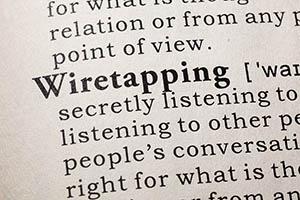Government Wiretaps Versus Your End-to-End Encryption

A new, just released report shows the number of federal and state-authorized wiretaps conducted in 2019. A wiretap is a court-authorized warrant, allowing law enforcement to listen to and record conversations and/or text messages on a target’s phone. In most jurisdictions, the law enforcement agency applying for such an order must demonstrate that there is probable cause to believe that the target is engaged in a specified unlawful activity, that he uses the particular phone to conduct his illegal activity, that traditional methods of investigation have been tried or would not likely be successful, and that the wiretap is necessary to uncover the full extent of the target’s criminal activity, and/or the other coconspirators’. Such authorizations are usually limited to a 30-day period, but can be extended by a court under certain circumstances. Many individuals in the United States use encrypted messaging to protect their privacy – some for innocuous reasons, others for more illicit ones. Encryption may not, however, protect messages and conversations from being produced pursuant to a wiretap.
The aforementioned report shows court-approved wiretaps have increased over time. State wiretaps that uncovered encrypted messages increased to 343 in 2019, up from 146 the prior year. Of these, authorities were unable to decipher plain text messages in all but 9. Of the 121 federal wiretaps seeking messages with encryption, authorities were unable to decipher 104.
The report’s findings come as a debate heats up in Congress. A fight is raging regarding whether tech companies, such as Facebook, Apple and WhatsApp, should be compelled to allow law enforcement access to the encrypted messages. U.S. Attorney General Barr and FBI Director Wray have called on these tech companies specifically to allow court-authorized access. They argue that without access to encrypted messages, drug dealers, terrorists and the like have a simple way to thwart legitimate government investigations.
The majority of wiretap investigations are drug related. New York and California account for half of the state applications. The Southern District of New York leads in federal applications.
Privacy advocates, cyber security experts, and major tech companies argue that allowing law enforcement access to encrypted platforms would jeopardize privacy by allowing malicious actors a way into the platforms. The argument goes that any back door that would defeat the end-to-end encryption would be a way in for hackers. Whether the tech companies will bend to law enforcement’s increasing frustration remains to be seen.
This is an ever-developing and expanding area of law. It is important to hire well-versed and adept counsel when dealing with law enforcement’s intrusion into your personal data. We at Stahl Gasiorowski Criminal Defense Lawyers aggressively defend individuals charged with complex federal and state crimes. To contact the firm, call 908.301.9001 for the NJ office and 212.755.3300 for the NYC office, or email Mr. Stahl at rgs@sgdefenselaw.com.















